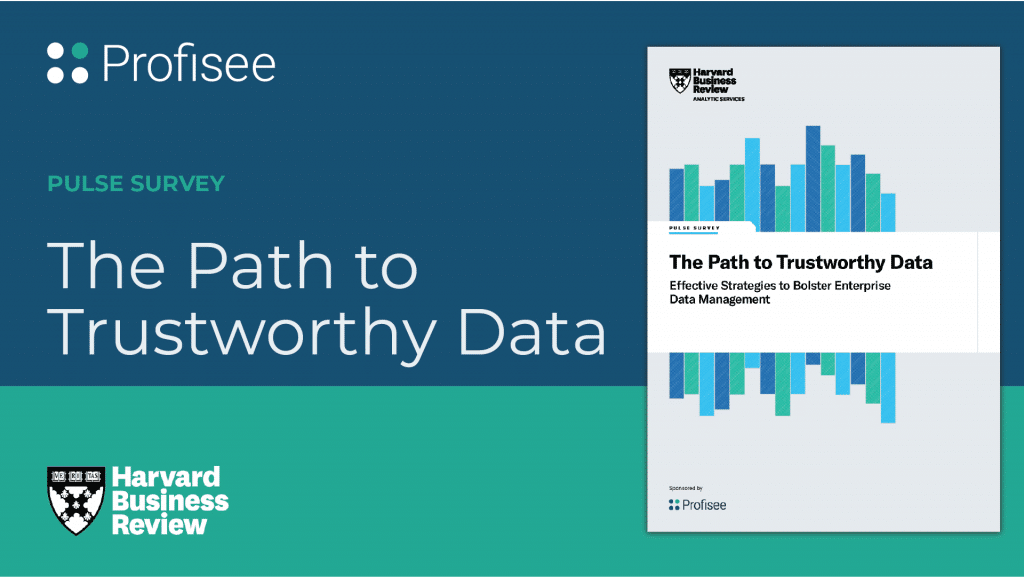ALPHARETTA, Ga., August 10, 2021 — While organizations consider data to be a strategic asset and business imperative, 60% believe their organizations are under-investing in their enterprise-wide data strategy, preventing valuable data from being used more broadly according to a recent Profisee-sponsored survey of 343 executives by Harvard Business Review Analytic Services.
This lack of investment in ensuring that their data is trustworthy is out of step with its importance. Virtually all (96%) say it is very or moderately important, but less than half (45%) say they are putting a great extent of work toward ensuring their data meets this standard. As a result, most respondents feel their organizations are not ahead of their competitors. To download the complimentary report, click here.
In the wake of this low data maturity, companies are awash in data problems — including inaccurate/incomplete data and data silos (87% each), inconsistent data formats (80%) and poor enterprise data governance and conflicting information between data sources (77% each). The problem is increasing as well, as 82% of respondents expect the number of different data types used in their organization’s business operations to increase over the next two years.
Executives generally agree on the key steps required to improve their data management strategies, as two-thirds (67%) of respondents cited data governance (DG) as most critical and over half (55%) cited master data management (MDM). However, too often companies do not implement them because of their inability to gain support from others in the organization who do not understand the technology or do not immediately appreciate its benefits.
That hesitancy is self-defeating considering that the survey reveals that MDM and data governance are highly effective when implemented, as 70% of respondents whose companies have implemented DG say their organizations’ approach to enterprise-wide data governance is moderately or very effective today. Even a greater number (74%) of respondents whose companies have employed master data management say their organizations’ approach to MDM is moderately or very effective. More importantly, 87% of all respondents believe having a strong MDM program is important to ensuring the future success of their organization.
“Through our new research, we know that many organizations haven’t taken the critical steps needed to leverage their data as a strategic asset,” said Alex Clemente, Managing Director of Harvard Business Review Analytical Services. “Though data volumes continue to grow — and as businesses continue to deal with increasing data volumes and an ever-growing number of data types — respondents expressed how implementing data governance and master data management — while nurturing a strong data culture and working iteratively for successive wins — is the path to trustworthy data.”
| Q: Which enterprise data strategies are in place at your organization today? Select all that apply. | Important to Have | Have in Place |
| Implement data governance | 67% | 42% |
| Implement master data management | 55% | 28% |
| Have a data auditing process in place | 38% | 25% |
| Appoint a chief data officer | 29% | 21% |
| Leverage data lakes/warehouses | 27% | 39% |
| Leverage cloud platforms | 21% | 54% |
| Hire data stewards | 17% | 22% |
“In today’s hyper-competitive, time-compressed world, the effective and efficient use of data is the linchpin of achieving widespread corporate objectives. Companies can no longer afford to ignore raising the quality and value of their data to truly leverage it as a strategic asset,” said Len Finkle, CEO of Profisee, a pioneer in master data management solutions. “This report serves as a practical guide for organizations looking to start or accelerate their journey to building a foundation of trusted enterprise data. The stories, quantitative surveys, and interviews with experts demonstrate that leveraging high-quality, trusted data is within reach of all businesses, regardless of size or industry. Once they take the critical step of using MDM to enforce their data-quality standards and achieve the high-quality data needed to fuel innovation and agility in today’s evolving business landscape.”
Resources:
- Read the full survey and report findings
- Learn how Domino’s leverages Profisee in this case study
Methodology:
The Harvard Business Review Analytic Services survey includes the responses from 343 executives in June 2021 to get their insights on data management strategies and outcomes. Quantitative surveys are conducted with the HBR’s audience, and qualitative research is conducted with senior business executives and subject matter experts from within and beyond the Harvard Business Review author community. Users from various industries, roles, and regions participated.
About Profisee
The Profisee MDM Platform provides organizations a fast, affordable, and scalable solution to deliver trusted data across the enterprise without the cost, complexity, and risk of traditional MDM solutions. Built for the cloud, Profisee offers the industry’s first and only cloud-native containerized Platform-as-a-Service (PaaS) MDM solution giving customers the freedom to choose their deployment, on-premise, in the cloud, or via a hybrid model. With an industry-leading low total cost of ownership, fast implementations and a truly flexible multidomain platform, Profisee has helped customers “make MDM a way of life” as they approach digital transformation and deliver business outcomes using high quality, trusted data. Profisee operates in the United States, Europe and Australia directly and also through a network of Value-Added Resellers, Systems Integrators and world-class Professional Consulting firms across the globe. For more information, please visit https://profisee.com.
About Harvard Business Review Analytic Services
Harvard Business Review Analytic Services is an independent commercial research unit within Harvard Business Review Group, conducting research and comparative analysis on important management challenges and emerging business opportunities. Seeking to provide business intelligence and peer-group insight, each report is published based on the findings of original quantitative and/or qualitative research and analysis. Quantitative surveys are conducted with the HBR Advisory Council, HBR’s global research panel, and qualitative research is conducted with senior business executives and subject matter experts from within and beyond the Harvard Business Review author community.






